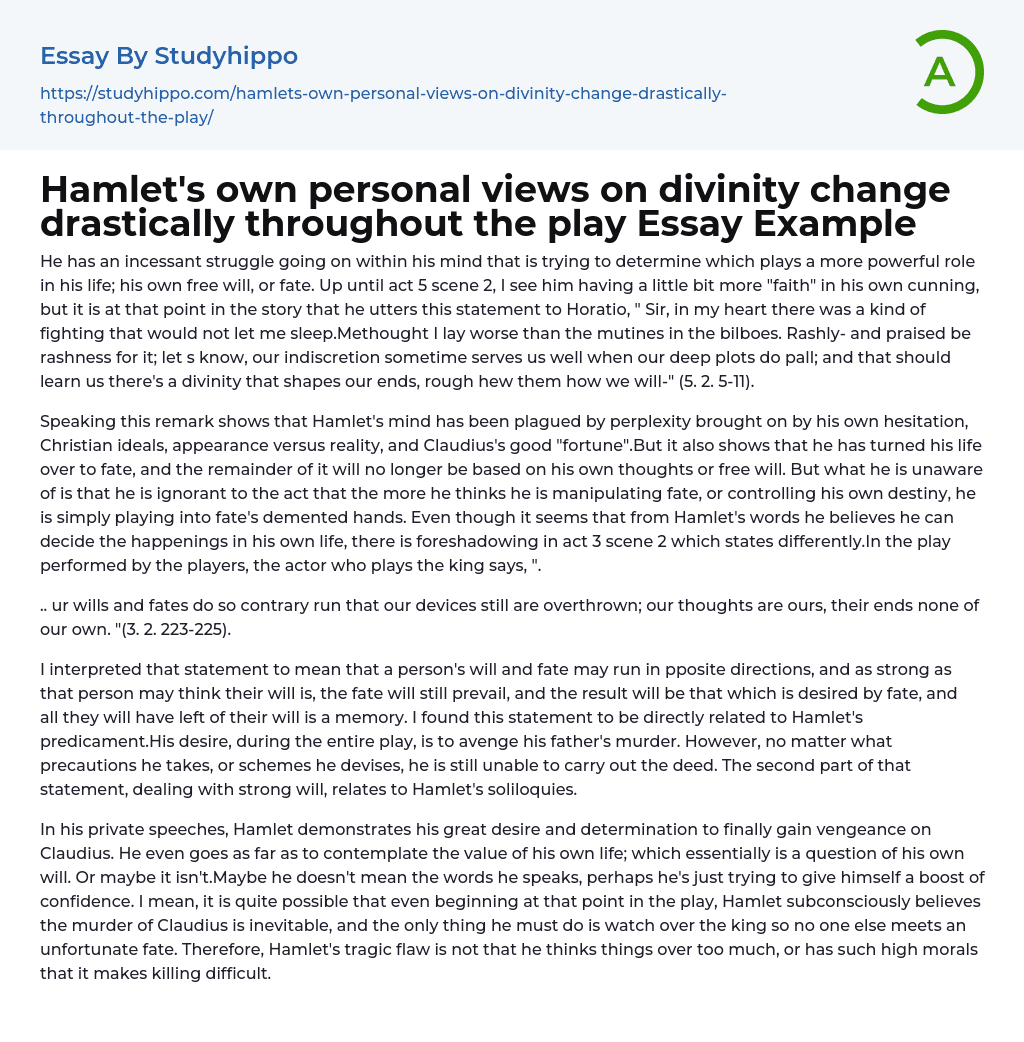

Hamlet’s own personal views on divinity change drastically throughout the play Essay Example
Throughout the play, there is a constant struggle within the protagonist's mind to determine which force holds more power in his life - his own free will or fate. While he tends to rely on his cunning, in Act 5 Scene 2 he reveals to Horatio that he has been grappling with an inner conflict. He recognizes that impulsiveness can sometimes be advantageous and acknowledges the existence of a divine energy that shapes our destiny, regardless of our attempts at control. As he states, "there's a divinity that shapes our ends, rough hew them how we will." (5.2.5-11)
Hamlet's mind is troubled by his own indecision, Christian beliefs, the conflict between appearance and reality, and Claudius's good fortune. He believes that he has surrendered his life to fate and that he can no longer operate based on his own t
...houghts or free will. Despite his attempts to manipulate fate and take control of his destiny, he is actually playing right into its hands. Hamlet may think he can determine the course of his life, but act 3 scene 2 foreshadows otherwise. During the play put on by the actors, the actor playing the king says...
The quote "our wills and fates do so contrary run that our devices still are overthrown; our thoughts are ours, their ends none of our own" (3.2.223-225) is expressed in the specified paragraph.
According to the statement, a person's will and fate can lead in opposite directions. Although one's will may be strong, fate ultimately triumphs and produces the desired result. The only remnant of the will is a memory. This directly mirrors Hamlet's predicament as he endeavors to seek revenge for hi
father's assassination but fails to do so. The theme of strong determination also intersects with Hamlet's soliloquies throughout the play.
Hamlet's personal soliloquies expose his intense yearning for vengeance against Claudius. He even considers the value of his own existence, doubting his determination. It is possible that he does not sincerely mean these words and is merely attempting to bolster his self-assurance. Nonetheless, it is probable that Hamlet subconsciously believes in the inevitability of Claudius' assassination and feels obliged to guard the king so that no one else will undergo a comparable fate. Thus, Hamlet's tragic flaw does not stem from excessive rumination or having morals too high to permit killing.
Hamlet's lack of action is rooted in his strong belief in destiny. His understanding of divinity is that it will inevitably happen, regardless of any attempts to prevent or alter it. Although some argue that he defied fate by switching the letters with Rosencrantz and Guildenstern and avoiding death, I believe he simply overcame a poorly executed plan by the king and outsmarted two foolish individuals.
Hamlet believed his ultimate purpose was to avenge his father's death and carry out the ghost's commands as evident through his statement, "My fate cries out and makes each petty artery in this body as hardy as the Nemean lion's nerve" (1.4.91-93). This suggests that Hamlet accepted that his fate was to fulfill the will of destiny represented by the ghost.
Shortly after Hamlet goes after the ghost, Horatio and Marcellus remain alone and provide additional evidence about the scene. They have a short discussion about whether to follow Hamlet or not, which leads Marcellus to state, "There is something rotten in
the state of Denmark" (1.4.100).
Horatio suggests that the outcome of the play will be guided by Heaven, stating "Heaven will direct it" (1.4.101). This indicates that he may already know the conclusion and is providing a hint to the audience. It is noteworthy that Horatio mentions that it is Heaven, rather than Hamlet, who will be in control.
Hamlet's conviction in destiny is most aptly illustrated by his decision to engage in a duel with Laertes. Despite any skepticism he may have harbored, his unwavering faith in fate impels him to accept the challenge. He does so despite the peril it poses to his life and the potential that any wrongs inflicted upon him may go unrighted. Hamlet's serene composure leading up to the contest and his readiness to face mortality emanate not only from his belief in destiny but also from his role as king. His destiny, which involves restoring order to Denmark through selfless acts of compassion, exposes his true character.
- Adaptation essays
- Adventure essays
- Adversity essays
- Aging essays
- Alcohol essays
- Barbie Doll essays
- Beauty essays
- Care essays
- Carpe diem essays
- Change essays
- Chess essays
- Chicken essays
- Choices essays
- Contrast essays
- Crops essays
- Development essays
- Dream essays
- Evil essays
- Experience essays
- Family essays
- Farm essays
- Fire essays
- First Love essays
- Focus essays
- Greed essays
- Hero essays
- Holiday essays
- House essays
- Housing essays
- Humility essays
- Humor essays
- Hypocrisy essays
- Integrity essays
- Law of Life essays
- Life Changing Experience essays
- Life Experience essays
- Lifestyle essays
- Limitations essays
- Love Story essays
- Mother Tongue essays
- Motherhood essays
- My Neighborhood essays
- Myself essays
- Mystery essays
- Narcissism essays
- Never Give Up essays
- Nursing essays
- Object essays
- Opportunity essays
- Peel essays



